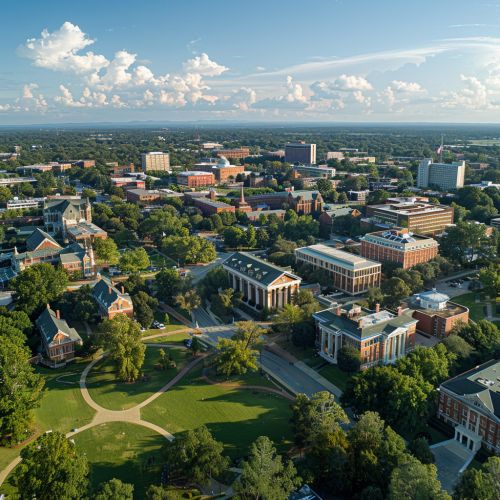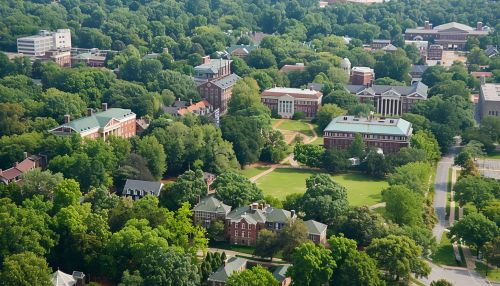University of Alabama
History
The University of Alabama (UA), established in 1831, is the oldest and largest public university in the state of Alabama. Located in Tuscaloosa, the university was founded by the Alabama Legislature to provide higher education opportunities to the citizens of the state. The university's early years were marked by financial struggles and political challenges, but it gradually grew in size and reputation.
During the American Civil War, the university was heavily affected, with many of its students and faculty joining the Confederate Army. In 1865, Union troops burned much of the campus, leaving only a few buildings standing. The university reopened in 1871 and has since undergone significant expansion and development.
Campus
The University of Alabama's campus covers approximately 1,970 acres and includes a mix of historic and modern buildings. The campus is known for its beautiful landscaping and architectural diversity. Key buildings include the Gorgas Library, Denny Chimes, and the Foster Auditorium.


The campus also features several research facilities, including the Alabama Innovation and Mentoring of Entrepreneurs (AIME) building and the Bevill Research Building. These facilities support the university's mission of advancing knowledge through research and innovation.
Academics
The University of Alabama offers a wide range of undergraduate, graduate, and professional programs through its 13 colleges and schools. These include the College of Arts and Sciences, the College of Engineering, the School of Law, and the Culverhouse College of Business.
The university is classified as a Doctoral Universities – Very High Research Activity institution by the Carnegie Classification of Institutions of Higher Education. This designation reflects the university's commitment to research and its significant contributions to various fields of study.
UA is also home to several research centers and institutes, such as the Alabama Transportation Institute, the Center for Advanced Public Safety, and the Institute for Social Science Research. These centers facilitate interdisciplinary research and collaboration among faculty, students, and external partners.
Student Life
The University of Alabama has a vibrant student life, with over 600 student organizations, including academic clubs, cultural groups, and service organizations. The university's Greek system is one of the largest in the nation, with numerous fraternities and sororities that play a significant role in campus life.
The university's athletic teams, known as the Alabama Crimson Tide, compete in the Southeastern Conference (SEC) and have a storied history of success, particularly in football. The football team, led by head coach Nick Saban, has won multiple national championships and is a source of pride for the university and its supporters.
Research and Innovation
The University of Alabama is committed to advancing knowledge through research and innovation. The university's research efforts are supported by various funding sources, including federal and state agencies, private foundations, and industry partners.
One notable research initiative is the Alabama Water Institute, which focuses on addressing water-related challenges through interdisciplinary research and collaboration. The institute brings together experts from various fields, including engineering, environmental science, and public policy, to develop innovative solutions for water management and conservation.
Another key research area is the university's work in aerospace engineering. The university's aerospace engineering program is recognized for its contributions to the field, including research on advanced propulsion systems, materials science, and aerodynamics.
Notable Alumni
The University of Alabama has produced many notable alumni who have made significant contributions to various fields. Some of the university's distinguished alumni include:
- Harper Lee, author of "To Kill a Mockingbird"
- Joe Namath, Hall of Fame NFL quarterback
- E. O. Wilson, renowned biologist and two-time Pulitzer Prize winner
- Condoleezza Rice, former U.S. Secretary of State
These individuals exemplify the university's commitment to excellence and its impact on society.
See Also
- Tuscaloosa, Alabama
- Southeastern Conference
- American Civil War
- Doctoral Universities – Very High Research Activity
- Aerospace engineering
